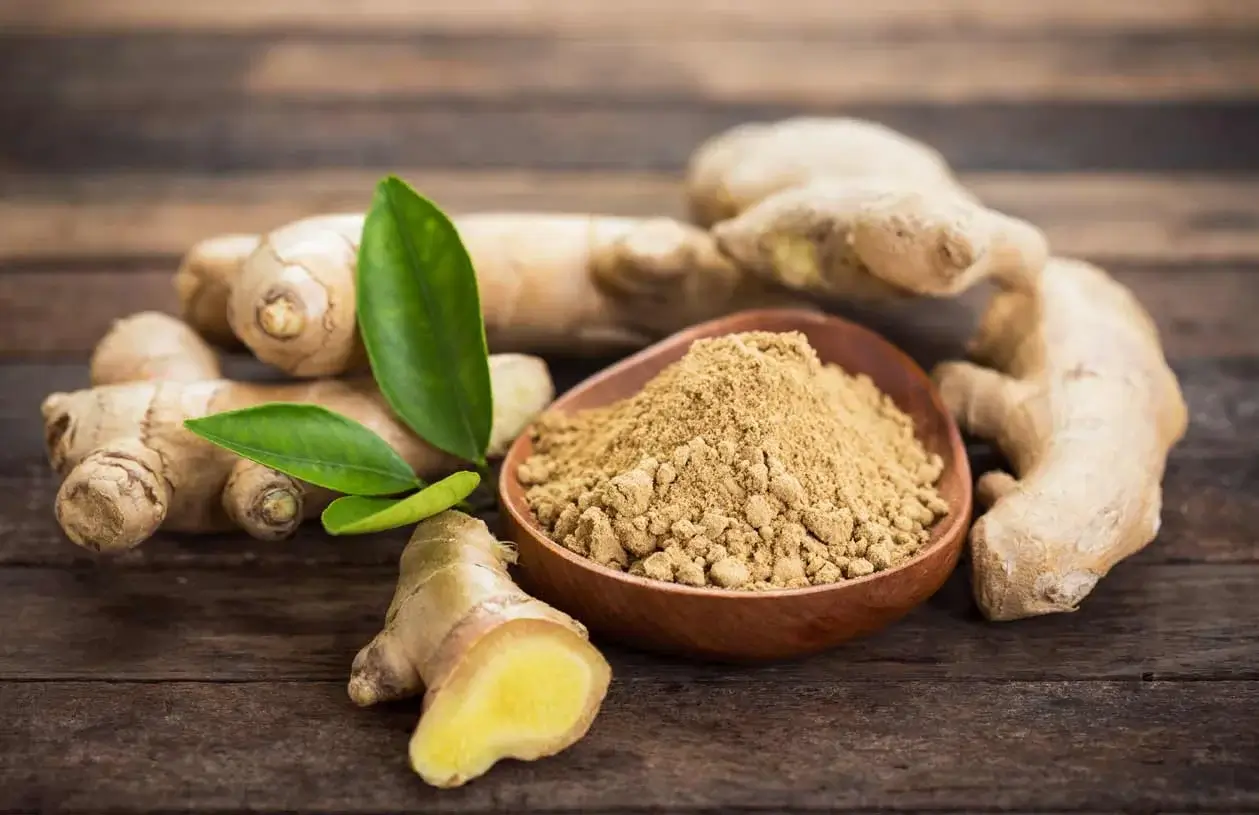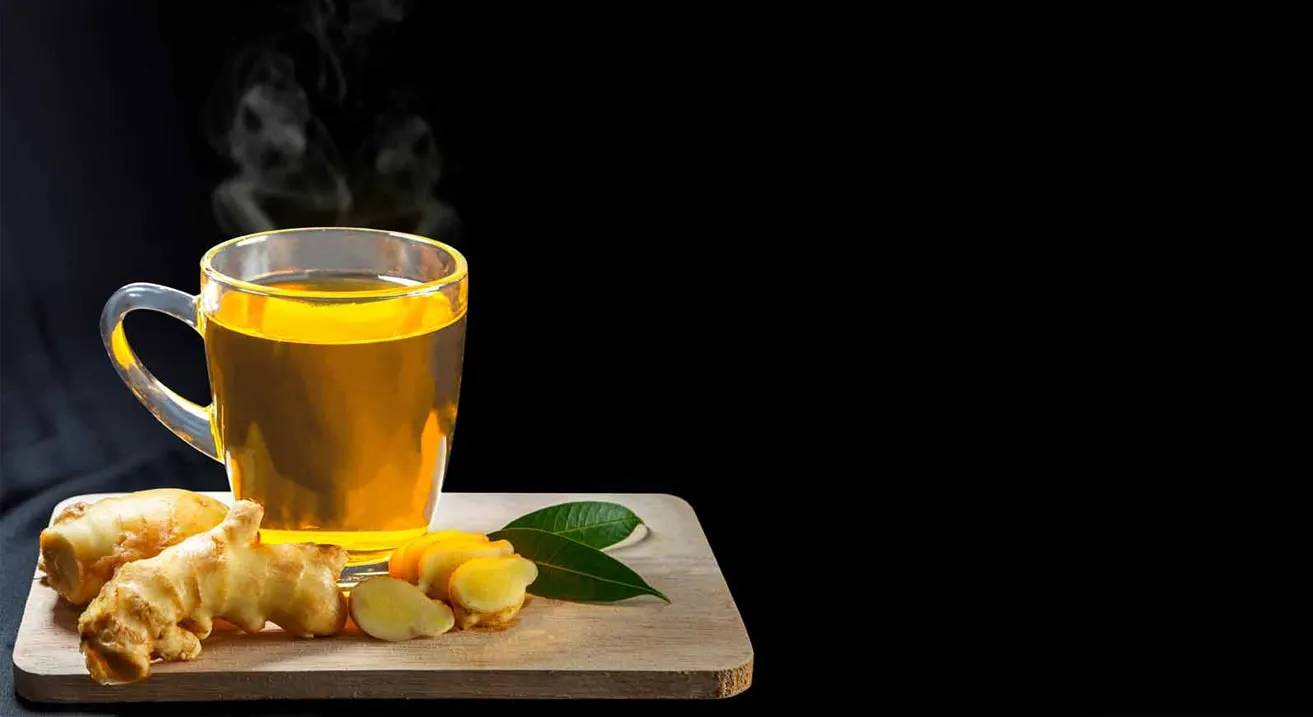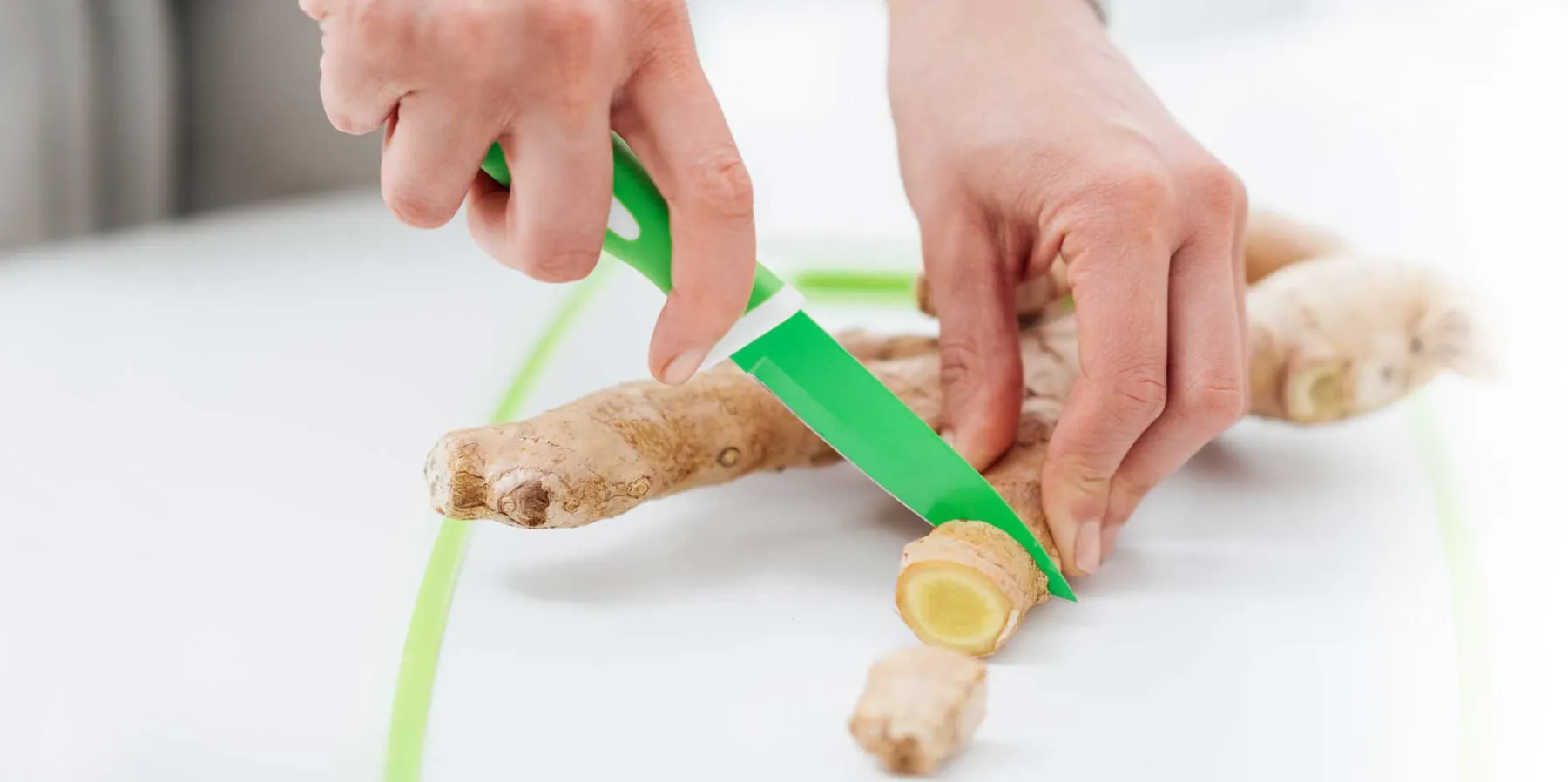Benefits and Uses of Ginger

Fresh ginger root, dried ginger, and ground ginger powder all have anti-inflammatory, antimicrobial, and anti-spasmodic uses in natural medicine. You can eat raw ginger or drink ginger tea to help prevent and treat nausea, improve your cardiovascular health, and boost your brain function.
Fresh Ginger vs. Ground Ginger (Powder Form of Ginger)
To benefit from the medicinal value of ginger (botanical name is Zingiber officinale), it is important to know which the best kind of ginger to use is. The good news is that both fresh ginger and ground ginger powder have many health benefits.
Research has discovered that fresh ginger contains many anti-inflammatory properties and antioxidants called gingerols and shogaols. Gingerol compounds are more prevalent in fresh ginger. Gingerols have been linked to reducing obesity, treating diabetes, and they also have anticancer properties.
Drying ginger and making ginger powder changes the chemical makeup of ginger. Dehydrating ginger causes an increase in the amount of shogaols in ginger powder. Research suggests that shogaols are more potent than gingerols in treating and preventing many health conditions.
Interestingly, the Journal of Chromatography B reported that the antioxidant activity of ground ginger is over 5-fold higher than fresh ginger.
Studies have also shown that boiling or roasting ginger for between 2 and 6 minutes actually increases the antioxidant potential of ginger.
Both fresh ginger root and ginger powder have powerful medicinal compounds that have antioxidant properties. Some researchers say that dried ginger powder can be a more cost-effective way to get the medicinal benefits of ginger with the advantage that it doesn’t go off.
Ginger Nutrition Facts
Ginger root is good for you because it contains vitamins and minerals as well as antioxidants.
The nutritional value of 100 g fresh, raw ginger root is the following:
- 80 calories
- 17.7 g carbohydrates
- 1.82 g protein
- 2 g fiber
- 1.7 g sugar
- 16 mg calcium
- 43 mg magnesium
- 415 mg potassium
- 13 mg zinc
- 5 mg vitamin C
The book Herbal Medicine says that ginger has over 115 therapeutic compounds. Gingerols and shogaols in ginger have antioxidant, anti-inflammatory, anti-nausea, and anticancer properties. Ginger root and ground ginger can also help prevent cardiovascular disease.
Benefits of Ginger and Ginger Tea

Let’s look in more detail at the many health benefits of ginger tea, consuming fresh ginger root, or taking powdered ginger capsules.
Ginger is Anti-Inflammatory and Can Help Manage Arthritis Symptoms
Reducing inflammation is an important health benefit of taking ginger root or drinking ginger tea.
6-Gingerol is one of the main anti-inflammatory components in ginger. Research has suggested that gingerol helps to inhibit substances and enzymes that cause inflammation.
Ginger extracts can be beneficial to reduce inflammatory pain caused by osteoarthritis. One study found that people with osteoarthritis who took ginger extract experienced a reduction in inflammatory pain. When compared to the anti-inflammatory drug diclofenac, scientists noted that ginger was just as effective but had less gastrointestinal side effects like heartburn.
Research into the effects of gingerol and shogaol compounds in ginger has found that consuming ginger can help relieve joint inflammation in rheumatoid arthritis. Scientists found that ginger taken orally has a similar effect to NSAIDs (non-steroidal anti-inflammatory drugs) like ibuprofen in reducing pain and inflammation.
If you suffer from forms of arthritis, ginger root capsules can help to reduce your symptoms. You can also add grated ginger to your diet by adding it to salads, using in a stir-fry or adding it to hot water to make an anti inflammatory ginger tea.
Ginger May Help Reduce Pain
The pain-relieving properties of ginger tea can also help to reduce pain, especially muscle pain after exercise.
A systematic review of 7 studies into the analgesic effect of ginger found that it can help relieve painful muscles after resistance training. Researchers found that supplementing your diet with 2 g ginger (1 tsp) per day can help to lower muscle pain when taken for at least 5 days.
Other studies have found that ginger can help to reduce inflammation that is the result of cardio exercising.
A review of medical studies over a 10-year period concluded that ginger helps to reduce the progression of muscle pain over a period of time. Some researchers have found that taking ginger before cardio exercising could lessen muscle pain.
Ginger powder is also helpful as an anti-inflammatory, pain relieving remedy that is as effective as ibuprofen.
Ginger Can Reduce Menstrual Cramping and Pain
The anti-spasmodic properties of ginger tea can help to relieve abdominal pain associated with menstruation (dysmenorrhea).
One randomized, controlled trial on 120 women found that ginger root powder reduced menstrual pain. The women in the trial suffered from moderate or severe period cramping. Taking 500 mg capsules of ginger root powder three times a day helped to reduce pain and abdominal aches in the first few days of their menstrual period.
A systematic review of 7 studies also found that ginger powder helps to relieve menstrual cramping in the first 3 or 4 days of menstruation. These studies suggested that taking 750 mg to 2,000 mg ginger powder helps to relieve dysmenorrhea.
Ginger Promotes Healthy Digestion and Can Prevent Heartburn
Consuming more fresh minced ginger or drinking ginger tea can help to improve your digestion. Indigestion is often accompanied by heartburn (acid reflux) and excess gas.
One of the ways that ginger benefits your gastrointestinal system is that it helps food to pass through the digestive system easier. A study has found that taking ginger capsules can help food move through you digestive system faster. The researchers concluded, “Ginger accelerates gastric emptying and stimulates antral contractions in healthy volunteers”.
Studies have revealed that compounds in ginger have a beneficial effect on the gastric tract and help reduce spasms. It was suggested that chewing ginger, taking ginger candies, consuming ginger tea, or taking ginger root capsules could all have a therapeutic effect in relieving gastrointestinal upset.
Ginger Helps Prevent Nausea and Vomiting
One of the most well documented uses for ginger root or ginger tea is to prevent nausea and digestive upset.
The main medicinal compounds in ginger, shogaols and gingerols, help to soothe the gastrointestinal tract and help reduce symptoms of nausea and vomiting. Researchers describe ginger as having antiemetic properties and help relieve gastro-upset like abdominal cramping, nausea, and heartburn.
Ginger root capsules may relieve nausea and vomiting in pregnancy
In one trial, pregnant women received 1,000 mg ginger capsules per day or a placebo pill. The women taking ginger root pills reported a reduction in feelings of nausea and vomiting. The study concluded that ginger is good for relieving nausea and sickness during pregnancy.
Ginger powder capsules may reduce nausea during chemotherapy treatments
Ginger has antiemetic properties that also help treat chemotherapy-related nausea. One trial involved 576 patients. Those who took 500 mg or 1,000 mg ginger capsules per day reported a reduction in their symptoms of nausea.
Ginger Can Help Fight Infections
Ginger tea also has a positive effect on your immune system and can help you fight infections better.
Studies have found that gingerols and enzymes in ginger root and powder can reduce inflammation caused by viral infections. It was also found that ginger has antiviral properties.
Another study found that fresh ginger was superior to ground ginger root in helping to reduce the effect of respiratory viral infections. The scientists found that hot ginger tea made from fresh ginger has antiviral properties.
One study found that gingerols in ginger extracts have an antibacterial potential against various strains of bacteria.
Ginger Can Help Keep Your Heart Healthy and Lower Blood Pressure
Regularly drinking ginger tea is good for high blood pressure because of the flavonoids and other antioxidants it contains.
Researchers have found that ginger extracts can help lower blood pressure. They found that compounds in ginger like 6-shogaol and phenolic constituents helped to lower blood pressure and regulate heartbeat.
Other studies have pointed to the fact that ginger helps to prevent many cardiovascular diseases. Ginger has an anti-hypertension effect and reduces inflammation, which has an overall beneficial effect on the heart.
Ginger May Lower Cholesterol Levels Naturally and Prevent Blocked Arteries
Another of the benefits of consuming more ginger tea in your diet is that it can help to reduce levels of LDL cholesterol. Chewing ginger root can also help to prevent a buildup of plaque in your arteries.
The Journal of Nutrition reported that consuming ginger extracts can help to lower LDL cholesterol – the type of “bad” cholesterol that is associated with coronary heart disease. The phenolic compounds in ginger like zingerone, shogaols, and gingerols helped to reduce LDL cholesterol levels.
The above study also found that ginger benefits vascular health because it may prevent a buildup of artery plaque (atherosclerosis).
Atherosclerosis is a disease in which plaque builds up inside your arteries. It can cause narrowed arteries, angina, shortness of breath, stroke, and even a heart attack.
Ginger Promotes Healthy Brain Function
Ginger tea can also protect against cognitive degenerative diseases due to its powerful antioxidant effect on the brain.
The effects of oxidative stress can negatively affect brain function. Research into the effects of the ginger extract 6-shogaol found that its anti-inflammatory potential can help prevent memory loss in patients with dementia.
Other studies have shown that the antioxidants in ginger can help to increase cognitive function in humans. One trial involved middle-aged women who took ginger extract supplements for 2 months. Researchers found that ginger has a positive effect on memory and boosted working memory.
Ginger is Good for Liver Health
The antioxidant properties of ginger mean that consuming ginger tea has a positive effect on your liver.
For example, gingerol has shown to help remove toxins from the liver and reduce the negative effects of free radicals on liver health.
One trial involving 50 people with non-alcoholic fatty liver disease found that taking 2,000 mg of ginger supplements per day help to negate some of the effects of liver damage. 23 of the people in the trial took the ginger supplements and at the end of 12 weeks, it was found that some of their symptoms of non-alcoholic fatty liver disease were improved.
Ginger May Help You Lose Weight
Drinking ginger tea can help you lose weight and even help prevent obesity.
A systematic review of the effects of ginger on weight loss found promising results. Research found that ginger helps to inhibit intestinal fat absorption, control appetite, and increase the breakdown of fats during digestion.
Another systematic review of randomized controlled trials found that increasing ginger consumption in the diet can help to reduce body weight, improve fasting blood glucose levels, and lower waist to hip ratio.
Of course, ginger isn’t a wonder remedy that will in itself burn fat. However, studies suggest that using ginger as part of a wider weight-loss program could help you lose weight quicker.
Ginger Helps Soothe Airways and Alleviate Some Asthma Symptoms
One of the uses of ginger root or ginger tea is to help reduce inflammation and spasms in the airways. You can use fresh and dried ginger to help improve bronchial symptoms of asthma and respiratory infections.
A study from 2015 found that ginger has an anti-spasmodic effect and can help suppress airway inflammation. The researchers suggested that ginger is used to help reduce the symptoms of respiratory allergic responses.
Other research has discovered that ginger extracts can benefit people with asthma. Ginger compounds like gingerol and shogaol help to relax muscles in the airways. This could provide therapeutic relief from some symptoms of asthma.
Ginger and Ginger Extracts Have Anticancer Properties
Ginger root and ginger tea have anti cancer properties because of their powerful antioxidant compounds and anti-inflammatory properties.
Ginger contains anti-cancer compounds
A 2018 comprehensive review of the ginger extract 6-gingerol found that it has anticancer properties. Many studies point to experimental and clinical studies that have found that ginger has the potential to treat tumors and prevent the spread of malignant cancer cells.
A study published in the Journal of Food and Chemical Toxicology indicates that the gingerols, paradol, and shagaols contained in ginger are anti-cancer compounds that can help to prevent cancer.
Ginger extract may prevent or treat prostate cancer
The British Journal of Nutrition published the results of an American study in which ginger extract (zingiber officinale Roscoe) inhibited the growth of human prostate cancer cells.
The researchers concluded: “the present study is the first report to describe identification and detailed evaluation of in vitro and in vivo anticancer activity of whole GE (ginger extract) in the therapeutic management of human prostate cancer.”
Other studies have shown that 6-shogaol from dried ginger can help to treat prostate cancer.
Gingerol may help treat ovarian cancer
Angiogenesis is the term that describes the start of cancer. If you can stop cancer from taking hold in the ovaries then you can effectively prevent cancer.
In a laboratory study published by BMC Complementary and Alternative Medicine,scientists proved that the active ingredients in ginger root had anti-angiogenic properties and that may stop cancer cells from growing. The study concluded, “The use of dietary agents such as ginger may have potential in the treatment and prevention of ovarian cancer.”
Ginger for liver and colon cancer
In 2015 scientists presented evidence that ginger may prevent colon and liver cancer.
The scientists concluded, “A significant number of in vitro, in vivo, and epidemiological studies further provide substantial evidence that ginger and its active compounds are effective against wide variety of human diseases including GI cancer”. But they also added that more research is needed.
Ginger kombucha tea for breast cancer
Ginger-based kombucha tea could be used in treating some forms of breast cancer.
Although there are many promising results in using ginger as a therapeutic cancer treatment, it is still too early to say exactly how ginger can be used to treat cancer in humans.
How to Include Ginger in Your Diet

There are many other ways to get the benefits of eating raw ginger if you don’t want to make ginger tea. Here are some helpful tips for using more ginger in your diet:
- Put a piece of grated ginger or ginger slices into your smoothie before blending.
- Add chopped ginger root to a stir-fry.
- Mince ginger and add to a healthy salad dressing to spice up your salad.
- Add a teaspoon of dried ginger to sauces while cooking.
Look for our Ginger Tea Recipe blog to learn how to make your own ginger tea at home.
How Much Ginger Should You Consume?
Ginger is so concentrated with active ingredients and it means you don’t need to use much of it to enjoy its health benefits.
As for nausea for example, ginger tea with 1-2 inches of fresh ginger in hot water may be all you need to calm the stomach.
For rheumatic arthritis pain you need even smaller amount of ginger in food or in your ginger tea each day. People who consumed larger amounts of ginger reported rapid and better relief.
How to Buy and Store Ginger?
When you buy ginger, make sure that it is stiff to the touch and has smooth skin. Young fresh (and organic) ginger doesn’t require peeling of the skin and can be grated as it is.
However ginger that was left on the shelf for a long time will have a hard skin that needs to be peeled, and it will also be more fibrous.
You can store fresh ginger in a cool dry and dark place up to three weeks when it is not peeled, or in the freezer for up to six months.
Dried ginger powder should be stored in sealed glass jar in a cool, dark and dry place. If you keep it in the refrigerator, it will extend its shelf life for up to one year.
References:
- https://www.ncbi.nlm.nih.gov/books/NBK92775/
- https://www.sciencedirect.com/science/article/abs/pii/S0031942215300509
- https://www.sciencedirect.com/science/article/pii/S1570023216300095
- http://www.ifrj.upm.edu.my/17 (02) 2010/IFRJ-2010-335-347_Purnomo_Indonesia%5b1%5d.pdf
- https://www.ncbi.nlm.nih.gov/pmc/articles/PMC4571220/
RELATED POSTS